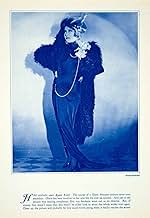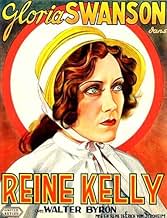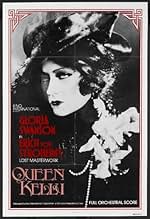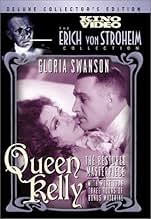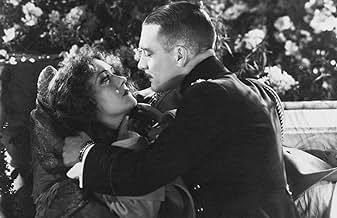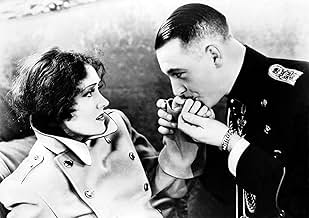CALIFICACIÓN DE IMDb
7.1/10
3.4 k
TU CALIFICACIÓN
Agrega una trama en tu idiomaA convent girl is abducted and seduced by a prince before being sent off to a brothel in East Africa.A convent girl is abducted and seduced by a prince before being sent off to a brothel in East Africa.A convent girl is abducted and seduced by a prince before being sent off to a brothel in East Africa.
- Dirección
- Guionistas
- Elenco
- Premios
- 1 premio ganado en total
Sylvia Ashton
- Kelly's Aunt
- (sin créditos)
Wilson Benge
- Prince Wolfram's Valet
- (sin créditos)
Sidney Bracey
- Prince Wolfram's Lackey
- (sin créditos)
Rae Daggett
- Coughdrops
- (sin créditos)
Robert Frazier
- Catholic Priest
- (sin créditos)
Florence Gibson
- Kelly's Aunt
- (sin créditos)
Madge Hunt
- Mother Superior
- (sin créditos)
Tully Marshall
- Jan Vryheid
- (sin créditos)
Ann Morgan
- Maid Escorting Kelly to Altar
- (sin créditos)
Madame Sul-Te-Wan
- Kali Sana - Aunt's Cook
- (sin créditos)
Lucille Van Lent
- Prince Wolfram's Maid
- (sin créditos)
Wilhelm von Brincken
- Prince Wolfram's Adjutant
- (sin créditos)
Gordon Westcott
- Lackey
- (sin créditos)
- Dirección
- Guionistas
- Todo el elenco y el equipo
- Producción, taquilla y más en IMDbPro
Opiniones destacadas
Eric Von Stroheim (1885-1957) was among the silent era's most visionary, artistically ambitious directors; Gloria Swanson (1897-1983) was among the screen's first "divas" and one of the silent era's greatest stars. With Swanson's lover Joe Kennedy (father of John, Robert and Ted) acting as money man, Von Stroheim and Swanson teamed to create a film that both believed would be crowing achievement of their careers: QUEEN KELLY.
Less than a third of the script was filmed when Swanson called Kennedy and demanded that Von Stroheim be fired. He was, and in his absence Swanson filmed several scenes intended to round out the story line and make the film fit for release. In doing so she reckoned with Von Stroheim, who had cannily held copyright and who flatly refused to permit distribution--and as the battle wore on sound began to roar, making the film less commercially viable with every passing day. Swanson was eventually able to release QUEEN KELLY in Europe, but it generated little interest and was soon withdrawn. It would not be seen in America until after Von Stroheim's death. It would be Von Stroheim's last major work as a director and it would effectively end Swanson's film career for a decade or more.
In the interval the reputation of QUEEN KELLY began to grow. It was, many declared, a lost masterpiece much like Von Stroheim's legendary GREED. And when it at last became widely available it leaped onto every critic and buff's short list of "important" silent movies. But time has a way of smoothing out peaks and valleys. Seen today, QUEEN KELLY is interesting--but only for what it might have been, not for what it actually is.
The story is distinctly odd. Prince Wolfram (Walter Byron) is betrothed to Queen Regina (Seena Owen), a vicious, half-mad, and intensely despot he despises. While riding in the country he comes upon a group of orphans that includes Kitty Kelly (Gloria Swanson), who makes an impression on him by loosing her bloomers and then angrily throwing them in his face when he laughs at her. Determined to see her again, the Prince stages a fire in the convent and under cover of smoke kidnaps Kitty and takes her to the palace, where she soon surrenders to his charms. But there is hell to pay when Queen Regina discovers the girl, and before you know it Prince Wolfram is in the dungeon and Kitty has, of all things, inherited a brothel in Africa. Will they find each other again? It is basically at this point that the film footage ends. The Kino release attempts to finish out the story with a handful of stills and title cards, and true enough we do learn the outcome of the story--but it is a very academic proposition, to say the very least, and although it seems to have a certain promise it is very hard to say what Stroheim might have done with the rest of the story. Hopefully more than he was able to do with the first third! For while the existing footage is not bad, it hardly compares with either Stroheim or Swanson at their finest.
Indeed, Swanson seems extremely miscast in the title role. It is utterly impossible to accept her as an innocent orphan raised in a convent. Much more interesting is Seena Owen as the evil Queen Regina, who is sullen, dangerous, and utterly fascinating; in the film's most memorable scene, in which Kitty is chased through the palace by the whip-wielding Queen, it is Owen who dominates the scene, not Swanson. As for Von Stroheim, he is clearly building a series of visual motifs that reference sex, most notably in his use of candles, fires, and smoke--but with the film suddenly unfinished it is very difficult to know to what end he intended it.
This is really a film for silent film connoisseurs, and even they may find it frustrating to the point of annoyance. The Kino print is very good, but there is no getting around the fact that the film itself ends at the very point at which our interest in both plot and characters begins to build. Recommended, but as a curiosity only. Trivia: some twenty years later Swanson and Von Stroheim co-starred in the legendary SUNSET BLVD--and the film that silent star Norma Desmond watches is none other QUEEN KELLY.
Gary F. Taylor (aka GFT, Amazon Reviewer)
Less than a third of the script was filmed when Swanson called Kennedy and demanded that Von Stroheim be fired. He was, and in his absence Swanson filmed several scenes intended to round out the story line and make the film fit for release. In doing so she reckoned with Von Stroheim, who had cannily held copyright and who flatly refused to permit distribution--and as the battle wore on sound began to roar, making the film less commercially viable with every passing day. Swanson was eventually able to release QUEEN KELLY in Europe, but it generated little interest and was soon withdrawn. It would not be seen in America until after Von Stroheim's death. It would be Von Stroheim's last major work as a director and it would effectively end Swanson's film career for a decade or more.
In the interval the reputation of QUEEN KELLY began to grow. It was, many declared, a lost masterpiece much like Von Stroheim's legendary GREED. And when it at last became widely available it leaped onto every critic and buff's short list of "important" silent movies. But time has a way of smoothing out peaks and valleys. Seen today, QUEEN KELLY is interesting--but only for what it might have been, not for what it actually is.
The story is distinctly odd. Prince Wolfram (Walter Byron) is betrothed to Queen Regina (Seena Owen), a vicious, half-mad, and intensely despot he despises. While riding in the country he comes upon a group of orphans that includes Kitty Kelly (Gloria Swanson), who makes an impression on him by loosing her bloomers and then angrily throwing them in his face when he laughs at her. Determined to see her again, the Prince stages a fire in the convent and under cover of smoke kidnaps Kitty and takes her to the palace, where she soon surrenders to his charms. But there is hell to pay when Queen Regina discovers the girl, and before you know it Prince Wolfram is in the dungeon and Kitty has, of all things, inherited a brothel in Africa. Will they find each other again? It is basically at this point that the film footage ends. The Kino release attempts to finish out the story with a handful of stills and title cards, and true enough we do learn the outcome of the story--but it is a very academic proposition, to say the very least, and although it seems to have a certain promise it is very hard to say what Stroheim might have done with the rest of the story. Hopefully more than he was able to do with the first third! For while the existing footage is not bad, it hardly compares with either Stroheim or Swanson at their finest.
Indeed, Swanson seems extremely miscast in the title role. It is utterly impossible to accept her as an innocent orphan raised in a convent. Much more interesting is Seena Owen as the evil Queen Regina, who is sullen, dangerous, and utterly fascinating; in the film's most memorable scene, in which Kitty is chased through the palace by the whip-wielding Queen, it is Owen who dominates the scene, not Swanson. As for Von Stroheim, he is clearly building a series of visual motifs that reference sex, most notably in his use of candles, fires, and smoke--but with the film suddenly unfinished it is very difficult to know to what end he intended it.
This is really a film for silent film connoisseurs, and even they may find it frustrating to the point of annoyance. The Kino print is very good, but there is no getting around the fact that the film itself ends at the very point at which our interest in both plot and characters begins to build. Recommended, but as a curiosity only. Trivia: some twenty years later Swanson and Von Stroheim co-starred in the legendary SUNSET BLVD--and the film that silent star Norma Desmond watches is none other QUEEN KELLY.
Gary F. Taylor (aka GFT, Amazon Reviewer)
Erich von Stroheim's infamous final stab at direction (unfinished, when the plug was pulled by producer and star Gloria Swanson) is a sophisticated piece of silent cinema, wrapped in a camp plot and looking fabulous.
Gloria Swanson plays Patricia Kelly, a convent girl who meets the Prince of her dreams ('wild' Wolfram, played by Walter Byron) while she is out with the nuns. After a risqué scene concerning the soldiers and her bloomers, Gloria prays to the Holy Virgin to let her see the Prince again, while the Prince feels trapped in his engagement to the mad Queen Regina (a scene-chewing Seena Owen).
The first half of the film concerns how 'Kelly' and Wolfram come to meet up again, this time in the Palace where the jealous Queen loses no time in whipping Kelly out of doors and roaring that the Prince is 'Mine, MINE, MINE!'. The second half (unfinished) concerns Kelly's fortunes thereafter, called by her dying aunt to Africa where she finds herself in a brothel and betrothed to loathsome cripple drunk Jan Vryheid (a repellent and compelling performance from Tully Marshall), and eventually (and improbably) turns the situation round to get her happy ending, 'Queen Kelly' again.
Gloria Swanson looks absolutely gorgeous in the shimmering black and white close-ups, and her acting as Kelly is impeccable throughout - no one made better use of the 'look of horror' or the 'dipping of eyelashes' or the 'flirty smile'. Walter Byron is a moustachioed hero in the mould of John Gilbert and is an amusing second lead.
With the gaps plugged by wordy slides (in some prints, Kelly becomes Kitty in these explanatory bits, but never mind ...) and still photographs, 'Queen Kelly' is a boisterous and worthy final feature for its director. Many have seen a small bit of this film as part of Norma Desmond's home projections in 'Sunset Boulevard', but try to see the full thing - hugely enjoyable, and if not as mushily romantic as 'The Wedding March', its satirical splendor more than makes up for it!
Gloria Swanson plays Patricia Kelly, a convent girl who meets the Prince of her dreams ('wild' Wolfram, played by Walter Byron) while she is out with the nuns. After a risqué scene concerning the soldiers and her bloomers, Gloria prays to the Holy Virgin to let her see the Prince again, while the Prince feels trapped in his engagement to the mad Queen Regina (a scene-chewing Seena Owen).
The first half of the film concerns how 'Kelly' and Wolfram come to meet up again, this time in the Palace where the jealous Queen loses no time in whipping Kelly out of doors and roaring that the Prince is 'Mine, MINE, MINE!'. The second half (unfinished) concerns Kelly's fortunes thereafter, called by her dying aunt to Africa where she finds herself in a brothel and betrothed to loathsome cripple drunk Jan Vryheid (a repellent and compelling performance from Tully Marshall), and eventually (and improbably) turns the situation round to get her happy ending, 'Queen Kelly' again.
Gloria Swanson looks absolutely gorgeous in the shimmering black and white close-ups, and her acting as Kelly is impeccable throughout - no one made better use of the 'look of horror' or the 'dipping of eyelashes' or the 'flirty smile'. Walter Byron is a moustachioed hero in the mould of John Gilbert and is an amusing second lead.
With the gaps plugged by wordy slides (in some prints, Kelly becomes Kitty in these explanatory bits, but never mind ...) and still photographs, 'Queen Kelly' is a boisterous and worthy final feature for its director. Many have seen a small bit of this film as part of Norma Desmond's home projections in 'Sunset Boulevard', but try to see the full thing - hugely enjoyable, and if not as mushily romantic as 'The Wedding March', its satirical splendor more than makes up for it!
The restored version of "Queen Kelly' shown on TCM recently was a revelation to those of us who only knew Gloria Swanson from "Sunset Boulevard" in the '50's. Swanson in 1928 had incredibly large and luminous (?green?) eyes, as well as that curiously angular lower jaw still evident in "Boulevard". She seemed fairly tall and almost husky in "Kelly", compared to many women (and men) of the 20's to the 50's who were physically quite small, and looked it in their screen roles. She was lovely in a unique way.
More importantly, I thought Swanson was GREAT in the part. What an incredible range of facial and body expressiveness! Given the restrictions of the plot, and doubtless a domineering director, Swanson did a tremendous job in making her character seem believable. Yes, perhaps she did look older than 18, but in my opinion, she could pass for 21 or so. She certainly didn't look older than her 31 years, as another reviewer opines. Perhaps her sheer acting skill and range of motion were convincing enough to play 10 years younger than her true age. It's done all the time on the stage and screen, why wouldn't it be acceptable in this 1928 film?
I found Walter Byron gorgeous, and strangely modern in his good looks. Not of the now-hackneyed strong-profile leading man variety popular in early films. Instead, he was impeccably groomed and costumed, with short, straight, slicked-back hair. A beautiful sight to behold. He did a very good job within the constraints of silent acting. I'll be looking for more of his work.
The Jan VanHeidt character was almost too-disgusting to be credible, but archetypes were more pronounced in the silent genre. The actor did a very credible job, doubtless under the director's specific instructions about how to convey his debauched and depraved condition.
Perhaps it's because so much of the film was lost and/or cut, but Kelly's acquiescence to marrying the dissolute Jan seemed inexplicable to me. Von Stoheim went to a lot of trouble to give Swanson a L-O-N-G flashback while the wedding ceremony was being read which included the Prince's admonition to Kelly not to "forget him", "forsake him", or words to that effect. Yet she says yes anyway. You have to make a lot of assumptions about Kelly's character and personality to justify her decision, and rationalize in your own mind why on earth she didn't manifest some gumption and say after due consternation and anguish, "No, No, Never!".
This is a technically beautiful film. The lighting, sets, costumes, etc. are wonderful! Well worth seeing, even with the missing film and downbeat ending.
More importantly, I thought Swanson was GREAT in the part. What an incredible range of facial and body expressiveness! Given the restrictions of the plot, and doubtless a domineering director, Swanson did a tremendous job in making her character seem believable. Yes, perhaps she did look older than 18, but in my opinion, she could pass for 21 or so. She certainly didn't look older than her 31 years, as another reviewer opines. Perhaps her sheer acting skill and range of motion were convincing enough to play 10 years younger than her true age. It's done all the time on the stage and screen, why wouldn't it be acceptable in this 1928 film?
I found Walter Byron gorgeous, and strangely modern in his good looks. Not of the now-hackneyed strong-profile leading man variety popular in early films. Instead, he was impeccably groomed and costumed, with short, straight, slicked-back hair. A beautiful sight to behold. He did a very good job within the constraints of silent acting. I'll be looking for more of his work.
The Jan VanHeidt character was almost too-disgusting to be credible, but archetypes were more pronounced in the silent genre. The actor did a very credible job, doubtless under the director's specific instructions about how to convey his debauched and depraved condition.
Perhaps it's because so much of the film was lost and/or cut, but Kelly's acquiescence to marrying the dissolute Jan seemed inexplicable to me. Von Stoheim went to a lot of trouble to give Swanson a L-O-N-G flashback while the wedding ceremony was being read which included the Prince's admonition to Kelly not to "forget him", "forsake him", or words to that effect. Yet she says yes anyway. You have to make a lot of assumptions about Kelly's character and personality to justify her decision, and rationalize in your own mind why on earth she didn't manifest some gumption and say after due consternation and anguish, "No, No, Never!".
This is a technically beautiful film. The lighting, sets, costumes, etc. are wonderful! Well worth seeing, even with the missing film and downbeat ending.
Scandalous, characteristically grotesque parable of human degradation from director Eric Von Stroheim (Greed). Its original title was to be The Swamp, an appropriate description of the noxious mire in which the characters find themselves engulfed and (in this version anyway) overwhelmed. It is difficult to review this film given that approximately a third or so remains extant. The film was made over the final months of 1928 and early 1929, but production was halted at the request of star Gloria Swanson, whose production company was partly involved in its financing. The complete film was planned at some five hours running time. What remains is some seventy minutes of a complete first act and a lengthy fragment of a later bit of action set in East Africa which is included in the most recent restoration print (1985), along with production stills and intertitles which explain the main thrust of the missing pieces and the remainder of the story. As such what we have here is a work in progress, a segment of a complete work which makes any judgment upon its overall thematic coherence, direction, and execution speculative at best, moot at worst. Nonetheless students of film and film buffs in general will not want to miss an opportunity to see this fascinating bit of late twenties Hollywood history, not least of all because it was the last studio project for the much-maligned Von Stroheim. Having sat by and watched his masterpiece Greed torn apart by financiers and having the plug pulled on this one by none less than his own leading lady, he can't but have felt betrayed by the enchroacing commercialism in a medium of which he was proving a consummate artist. It is little wonder that Billy Wilder would cast him with gleeful sadism as the devoted butler to Swanson's decomposing harridan in Sunset Boulevard with all due historical irony, and perhaps it it even more fitting that Von Stroheim handled himself which such composure and dignity in the role.
Fortunately, Queen Kelly was shot in sequence, so the first seventy minutes or so is a coherent and well balanced bit of outrageous social hysteria. Set in a fictitious European kingdom of some sort, the events concern the pending engagement of mad Queen Seena Owen with the less than willing aristocratic playboy Walter Bryon, who prefers riding carriage horses to the hoots and hollers of female courtiers who bet their underwear on the outcome of the race. While the Queen strolls around her palace naked (strategically covered by well-placed objects, bits of scenery and a long-haired white cat), her eyes burning with paranoia and jealousy, Bryon encounters a young (Irish) convent girl (Swanson) with whom he falls instantly in love. Their meeting takes place one day whilst the prince is on manoeuvres with his regiment and the girl is out walking with her classmates under the supervision of nuns. Noticing that her bloomers have fallen around her ankles, the prince laughs and taunts her. Eventually seeing the funny side of it, the young lady returns his flirting glances, much to the shock of her protectors. The prince later conspires to meet her again by starting a fire in the convent (!), and 'rescues' her for an intimate dinner at the palace where Swanson is memorably framed by the burning flames of a roaring fire as Bryon devours and undresses her with his eyes.
The film exudes raw sexuality in almost every scene, concentrating on the hypocritical schizm between desire and propriety. Though romance and love seem to be in question, and Bryon makes an impassioned plea for his love for the young girl, there are few wholesome emotions on view here. From (literally) fire-fuelled lust and arrogant recklessness to enraged passion and sexual jealousy, the film teems with vileness. The world of the noble classes is opulent and packed with beautiful visual detail in typical Von Stroheim fashion, but is empty and evil in a way which makes all that follows an ever-darker descent into the nether regions of human degradation, climaxing with an extraordinary confrontation between Swanson and Owen where the Queen literally horse-whips her rival and drives her from the palace. In the version of the film released in 1931, it ends shortly after with Swanson throwing herself into the river and drowning, a fittingly melodramatic and damning end to a damned affair.
However, this was, as mentioned, merely the first act in a much longer and more layered study of the process of self-discovery and self-realisation, and intertitles explain that rather than perishing here, the girl is rescued and embarks on a wholly different adventure which takes her to German East Africa where her dying aunt runs a brothel. The story takes an increasingly bizarre turn as the old lady forces the girl into marriage with a loathsome, lecherous, beast of a man (played with festering glee by Tully Marshall). The restored footage (discovered in the 1960s) climaxes with an even more literal and disturbing rendition of the marriage/death scene from Greed, where literally over the dying body of her aunt, Swanson is married to Marshall, who is photographed to appear like a huge, white spider (an impression aided by the fact that he moves on wooden crutches and creeps like a predator sneaking up on prey) with soulless eyes and a body which seems to be decaying from inside, only gradually reaching the visible extremities as we meet him. Unfortunately, the footage ends at this point, and only scattered stills and intertitles briefly summarise what seems to have been a variant on the Marquis de Sade's Justine, where only by acknowledging and embracing one's basest nature can you rise and triumph over your enemies. Alas, without the benefit of the actual film to discuss, we can't really judge how successful a moral message this might have been.
As is, Queen Kelly is never less than fascinating. Von Stroheim's characteristic concerns are present, as is his penchant for grotesquerie and his explicit contempt for society, hypocrisy, and repression. It is wonderfully photographed by Gordon Pollock and Paul Ivano to enhance the richly venal world in which it is set. The original score by Adolph Tandler becomes repetitive, but this is as much because it has been added to the later sequences following its (re)discovery, and it, one presumes, like the film, is incomplete. It is certainly well worth seeing, though any conclusions as to its overall qualities are obviously tentative, as is any judgment of its potential contribution either to cinema on the whole, or a moral, parablistic cinema in particular.
Fortunately, Queen Kelly was shot in sequence, so the first seventy minutes or so is a coherent and well balanced bit of outrageous social hysteria. Set in a fictitious European kingdom of some sort, the events concern the pending engagement of mad Queen Seena Owen with the less than willing aristocratic playboy Walter Bryon, who prefers riding carriage horses to the hoots and hollers of female courtiers who bet their underwear on the outcome of the race. While the Queen strolls around her palace naked (strategically covered by well-placed objects, bits of scenery and a long-haired white cat), her eyes burning with paranoia and jealousy, Bryon encounters a young (Irish) convent girl (Swanson) with whom he falls instantly in love. Their meeting takes place one day whilst the prince is on manoeuvres with his regiment and the girl is out walking with her classmates under the supervision of nuns. Noticing that her bloomers have fallen around her ankles, the prince laughs and taunts her. Eventually seeing the funny side of it, the young lady returns his flirting glances, much to the shock of her protectors. The prince later conspires to meet her again by starting a fire in the convent (!), and 'rescues' her for an intimate dinner at the palace where Swanson is memorably framed by the burning flames of a roaring fire as Bryon devours and undresses her with his eyes.
The film exudes raw sexuality in almost every scene, concentrating on the hypocritical schizm between desire and propriety. Though romance and love seem to be in question, and Bryon makes an impassioned plea for his love for the young girl, there are few wholesome emotions on view here. From (literally) fire-fuelled lust and arrogant recklessness to enraged passion and sexual jealousy, the film teems with vileness. The world of the noble classes is opulent and packed with beautiful visual detail in typical Von Stroheim fashion, but is empty and evil in a way which makes all that follows an ever-darker descent into the nether regions of human degradation, climaxing with an extraordinary confrontation between Swanson and Owen where the Queen literally horse-whips her rival and drives her from the palace. In the version of the film released in 1931, it ends shortly after with Swanson throwing herself into the river and drowning, a fittingly melodramatic and damning end to a damned affair.
However, this was, as mentioned, merely the first act in a much longer and more layered study of the process of self-discovery and self-realisation, and intertitles explain that rather than perishing here, the girl is rescued and embarks on a wholly different adventure which takes her to German East Africa where her dying aunt runs a brothel. The story takes an increasingly bizarre turn as the old lady forces the girl into marriage with a loathsome, lecherous, beast of a man (played with festering glee by Tully Marshall). The restored footage (discovered in the 1960s) climaxes with an even more literal and disturbing rendition of the marriage/death scene from Greed, where literally over the dying body of her aunt, Swanson is married to Marshall, who is photographed to appear like a huge, white spider (an impression aided by the fact that he moves on wooden crutches and creeps like a predator sneaking up on prey) with soulless eyes and a body which seems to be decaying from inside, only gradually reaching the visible extremities as we meet him. Unfortunately, the footage ends at this point, and only scattered stills and intertitles briefly summarise what seems to have been a variant on the Marquis de Sade's Justine, where only by acknowledging and embracing one's basest nature can you rise and triumph over your enemies. Alas, without the benefit of the actual film to discuss, we can't really judge how successful a moral message this might have been.
As is, Queen Kelly is never less than fascinating. Von Stroheim's characteristic concerns are present, as is his penchant for grotesquerie and his explicit contempt for society, hypocrisy, and repression. It is wonderfully photographed by Gordon Pollock and Paul Ivano to enhance the richly venal world in which it is set. The original score by Adolph Tandler becomes repetitive, but this is as much because it has been added to the later sequences following its (re)discovery, and it, one presumes, like the film, is incomplete. It is certainly well worth seeing, though any conclusions as to its overall qualities are obviously tentative, as is any judgment of its potential contribution either to cinema on the whole, or a moral, parablistic cinema in particular.
In an ancient European kingdom, sultry Seena Owen (as Queen Regina V) lounges, awaiting her nuptials with dashing Walter Byron (as Prince Wolfram). Nearby, convent girl Gloria Swanson (as Patricia Kelly) encourages the Lord's wrath by sleeping with her photographs of the handsome Mr. Byron. While he is out riding one day, Ms. Swanson gets a chance to meet the idolized Prince, and embarrassingly loses her knickers! For Swanson and Byron, it's love at first sight. But, how can a simple convent girl get the Queen's stud?
Director Erich von Stroheim and actress Gloria Swanson, with their skills in full tilt excess, are a joy to behold. Yet, "Queen Kelly" emerges as a fairly strong film, despite its self-indulgence. Once considered a hopelessly unfinished work; the film has been restored, with great integrity, through intertitles, stills, and imagination. There is no doubt Swanson would have played the final reels expertly; but, there is no way to tell if Stroheim and Swanson would have re-shot some of her opening footage. Few convent girls looked as gorgeous as Gloria Swanson, with her amplified eyelashes. Though she isn't the first (or last) Hollywood convent inhabitant to look so ravishing, it would have been wise to tone down the look, until later in the film.
Flaws notwithstanding, "Queen Kelly" is full of great stuff. Tobacco-stained Tully Marshall (as Jan Vryheid) and whip-wielding Ms. Owen are delightfully outrageous. Byron, pocketing her knickers, is a thoroughly charming partner for Swanson. Stroheim, and photographers Gordon Pollock and Paul Ivano, are outstanding; a simple scene of Swanson praying, with candles dripping around her, is beautiful.
Ah, they had faces then
Director Erich von Stroheim and actress Gloria Swanson, with their skills in full tilt excess, are a joy to behold. Yet, "Queen Kelly" emerges as a fairly strong film, despite its self-indulgence. Once considered a hopelessly unfinished work; the film has been restored, with great integrity, through intertitles, stills, and imagination. There is no doubt Swanson would have played the final reels expertly; but, there is no way to tell if Stroheim and Swanson would have re-shot some of her opening footage. Few convent girls looked as gorgeous as Gloria Swanson, with her amplified eyelashes. Though she isn't the first (or last) Hollywood convent inhabitant to look so ravishing, it would have been wise to tone down the look, until later in the film.
Flaws notwithstanding, "Queen Kelly" is full of great stuff. Tobacco-stained Tully Marshall (as Jan Vryheid) and whip-wielding Ms. Owen are delightfully outrageous. Byron, pocketing her knickers, is a thoroughly charming partner for Swanson. Stroheim, and photographers Gordon Pollock and Paul Ivano, are outstanding; a simple scene of Swanson praying, with candles dripping around her, is beautiful.
Ah, they had faces then
¿Sabías que…?
- TriviaA clip from the film appears in El ocaso de una vida (1950), where Norma Desmond (played by Gloria Swanson), a silent movie star who is planning a comeback, watches one of her former films. Erich von Stroheim plays Max Von Mayerling, Desmond's butler, who serves as projectionist for the film clip. It is later revealed that Max was the silent movie director who discovered Norma Desmond. Director Billy Wilder recalled that it was von Stroheim's idea to use the clip from Queen Kelly (1932) in El ocaso de una vida (1950), to add realism.
- ErroresThe positions of the two different groups, the troops and the convent girls, are constantly changing in relation to the shrine on Kambach road.
- Citas
[as Wolfram and Fritz are racing their horses down the street]
Girl 1: Come on, Wild Wolfram! I've bet my nightie on you!
Girl 2: Come on, Fritz! She hasn't GOT a nightie!
- Versiones alternativasDirector Erich von Stroheim never completed the film: the ending is made using stills and subtitles. The European version has a different storyline than the American one.
- ConexionesEdited from Queen Kelly: The Kino Restored International Ending (2011)
Selecciones populares
Inicia sesión para calificar y agrega a la lista de videos para obtener recomendaciones personalizadas
- How long is Queen Kelly?Con tecnología de Alexa
Detalles
Taquilla
- Presupuesto
- USD 800,000 (estimado)
- Tiempo de ejecución1 hora 41 minutos
- Color
- Mezcla de sonido
- Relación de aspecto
- 1.33 : 1
Contribuir a esta página
Sugiere una edición o agrega el contenido que falta

Principales brechas de datos
By what name was Queen Kelly (1929) officially released in India in English?
Responda

